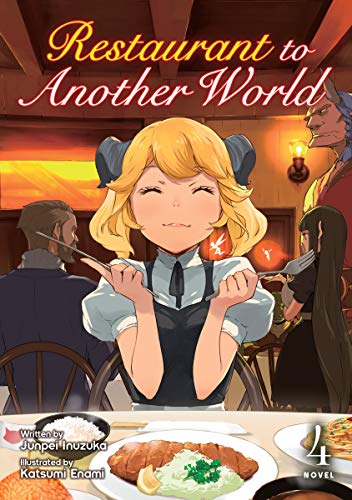By Junpei Inuzuka and Katsumi Enami. Released in Japan as “Isekai Shokudou” by Shufunotomosha. Released in North America by Seven Seas. Translated by Elliot Ryouga. Adapted by Nino Cipri.
This sat in my queue for a while, not because I don’t enjoy it, but because I know reviewing it will always be hard, as it’s 75% loving descriptions of food. We get rice burgers, French onion soup, Oyakodon, Peperoncino and potato chips, and trust me, they’re all described so that you immediately want to make the meal yourself. Sadly, there aren’t recipes included in these books the way you see with a lot of cooking manga (perhaps the manga version will add them?). In terms of the restaurant itself, the biggest development is that Aletta gets a raise, as she’s now been there for one year. That said, there’s a lot of development on the other side of the door in terms of worldbuilding. Indeed, we finally get the origin story for the doors, and it shows a tie between both worlds that is both surprising and obvious at the same time. Turns out it runs in the family.
This isn’t to say that we don’t get glimpses of the future as well. One of the book’;s more annoying but tolerable habits is to show a character won over by something the restaurant is serving and think about how to create it in their world, followed by a caption talking about how in a hundred years’ time, their names would be legendary in terms of achieving the objective. The fantasy world may lack preservatives, but it’s making do, and finding ways to at least come close to things that the restaurant can serve. There’s also more discussion of half-elf prejudice – we’ve seen this discussed before, but here we get it starkly laid out, as by chance one girl in a village born to two half-elfs is a “changeling” – essentially meaning she develops in elf terms. This leads to her being abandoned by the village for being “slow”, when in reality it’s more she’s still a baby. Fortunately, she gets rescued and apprenticed.
The book jumps around more than usual – there’s several chapters with the previous generation at the restaurant, and the prologue and final chapters deal with the generation before that. It turns out that Yomi, one of the saviors of the world from ancient times, was essentially blown up into our dimension, and ended up being found by the current manager’s grandfather. Them marrying is what led to the restaurant and the special relationship it has with her old world. Her husband has passed on, but she’s still around, and shows up at the final chapter to give her grandson the “master key” – in essence, showing she trusts that he can handle everything going forward. It’s not a “I’m about to die” sort of scene, but reads more as a passing of the torch – indeed, she reads like a tough old grandma, and even meets up with one of her old compatriots, now also an old man.
So another solid entry in the series, though as noted you’d better love descriptions of food. Fans should be quite hungry – I mean, happy.
